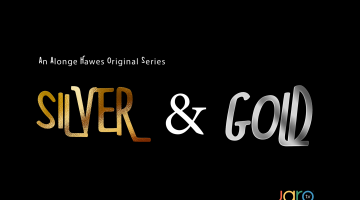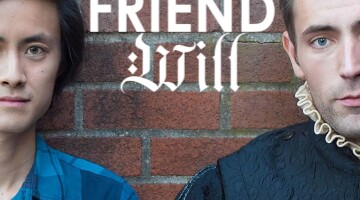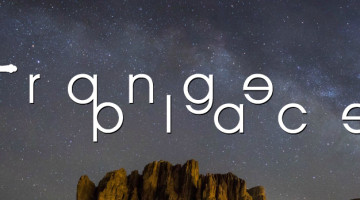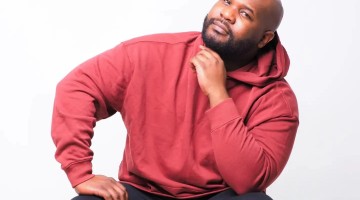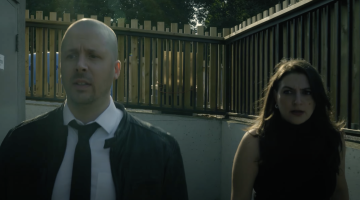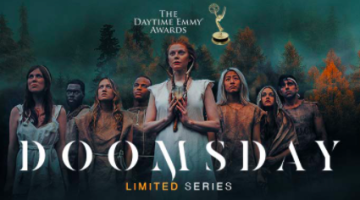Though actor Susan Gallagher’s scene-stealing appearances as “Homeless Lynn” on the hit Netflix Karate Kid-verse martial arts drama Cobra Kai have given Gallagher and her outspoken on-screen alter ego a remarkable cult following, it’s Gallagher’s portrayal of a middle-aged divorcee/mother undergoing a life-changing journey of sexual discovery in the acclaimed LGBTQ web series Queering that may be among the most meaningful role she’s shared with audiences in her two decades-long performing career.
Queering stars Gallagher (who also co-produced the series) as Val, who shocks her lesbian daughter Harper (Sophia Grasso) not just by announcing her separation from longtime husband Frank (Steve Schroko) but also by revealing to her that she’s bisexual. Val and Harper’s relationship instantly becomes strained due to the biphobia (the fear of bisexuality) that Harper feels towards her mother; a prejudice that also serves as an emotional shield for Harper after her ex-girlfriend MacKenzie (or Mickie, played by Molly McCluskey), dumps her for a straight male. As Harper’s free-spirited roommate Devon (Diana Oh) helps Val to get acclimated to her new life, Harper realizes she needs to accept Val for who she is and who she loves, and that she has to overcome her bi-phobia in order to keep her familial connection with Val from fracturing irreparably.
Gallagher, whose other past roles include NCIS: New Orleans, Tyler Perry’s The Haves and Have Nots, Aaron Spelling’s 1999 WB family drama Safe Harbor and Marvel’s Loki, joined Queering out of her own desire to play characters that completely transcended the emotional limitations of previous roles. Thanks to the creative vision of Queering creator Leticia De Bortoli, whose real life struggle with bi-phobia following her mother’s coming out was the inspiration behind this series, Gallagher found the depth she was looking for when she first read for the role of Val. As Gallagher tells me, both Queering, and the actor’s portrayal of Val in the series, will help others to deal with the complexities of their sexuality and the effects – both positive and negative – that it has on their loved ones.
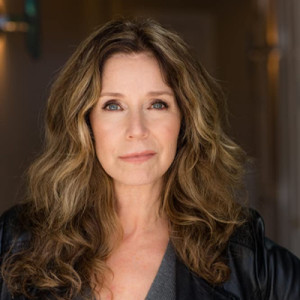
Actor/filmmaker Susan Gallagher, star of the critically acclaimed LGBTQ drama series QUEERING.
SR: Tell me about Val, the character you play in Queering. What is she like, and how does she relate to (and often conflict with) her daughter Harper and the other characters in the series?
SG: Val is a retired dentist who was married over 30 years to Frank, had two children, and has recently divorced and questioning her sexuality. She actually comes out as bisexual while visiting her daughter Harper in New York City, who is a lesbian. Harper does not quite know how to handle her mother coming out as bi. So it’s a story about the mother-daughter relationship. It’s also a story about an older woman, Val, coming out and questioning her sexuality and questioning a lot of things in her lives.
Obviously she was questioning her marriage to Frank and her profession that she finally did retire from, but (Queering is) also about dealing with your adult children. Val is trying to navigate all of these uncharted waters, and she’s a very grounded woman.
She is not emotional like Harper. Harper is the emotional, high-strung one. So there’s a little bit of a balance between those two characters, but Val is very sensible. She is balanced in her life, but she’s confused, and she’s questioning so many different things. So she’s having to try to figure out what’s going on with herself and (to) find her way in this new chapter of her life.
SR: How did you first get involved with Queering, and what drew you to playing the Val character in it?
SG: Several years ago, I had finally gotten to the point in my career that I was tired of waiting (by) the phone for my agent to call. I had usually just played roles that were very typical of someone who has my look and my essence, and I wanted to challenge myself as an actor. I wanted to do more character-type roles because I knew deep inside that I was drawn to more character-type roles, and (to) those crazier people or more complicated people or zanier people or whatever it may be. I just wanted a multi-dimensional, multi-layered kind of character to play as something that I could really sink my teeth into.
So I started submitting myself for indie projects and short films through Actors’ Access, a self-submission site, (and) through Backstage, (a web site) which usually (advertises) shoots in the New York City area. I’m normally in New York several months out of the year. They bring out daily breakdowns on both of those self-submission sites. I just happened to be looking at Backstage, and I saw this (breakdown) for Queering, and I saw the role of Val and the other roles. I checked out Leticia De Bortoli, who is the creator and director and writer of Queering. (I) checked out the DP (Queering’s director of photography Tulio Ferreira) and just who was involved (in the series’ production).
I’ve been doing this for a number of years, like I said, to give myself more opportunities to play these different type roles and just to challenge myself, and I always do my research and see if it’s somebody that I would like to work with; somebody that I would like to know that I feel is talented and professional, and the story speaks to me.
The role of Val definitely jumped out at me. I loved her from the very beginning, and so I submitted a headshot, and then I got an audition. So I went to my buddy’s studio, and I put myself on tape. I think I did a couple of different tapes, a couple of different options. Then I got a callback in New York. So I went in, and I met with Leticia and Sophia Grasso, who plays Harper. She was there in the hallway of the casting office along with Diana Oh, who plays Devon.
So we had already just formed a really cool little ensemble, and the energy between those characters and between us was just great. I knew when we went into the room, and we met with Leticia, and we’re just playing with these lines and trying to bring a little bit of truth to that moment that there was something very special there.
SR: When you first read the script for Queering, what impact did that have on you in both an emotional sense and in an acting sense?
SG: I think the first thing that jumped out at me was the fact that Leticia was focusing on an older woman who was coming out as bi because, I mean, you just don’t see that very often. I just thought that that was very gutsy of her to bring attention to that, and I thought it was something that was really important to be a part of.
Leticia does it with a lightness and with humor because it could be a very sensitive subject and a controversial subject because you’ve been a certain way for a number of years, and your society expects you to be what they’ve always seen. So change is difficult for all of us even though change can be very healthy, but it is a transition. I felt that that was an important story to include was what was going on with this older woman and her retirement and following her journey.

L-R: QUEERING co-stars Sophia Grasso, Susan Gallagher (center) and Diana Oh.
SR: What did you do to prepare for playing Val in Queering, and what were some of the biggest challenges and rewards you found in portraying this character?
SG: I had done quite a bit of preparation and discussed it in-depth and all the different angles. Of course, I’ve got lesbian and bisexual people in my life, friends, and family, and I’ve observed different relationships that they’ve had, but I don’t want to be a copyist. So I want to bring some authenticity to this woman, but I like to over-prepare and then go with the flow in the moment because I think if I’m feeling very prepared that I’m able to be freer in the moment to be creative and to see where Val takes me.
SR: Queering explores not just romantic relationships among the LGBTQ community but also the problem of biphobia, which is the fear of bisexuality as seen through the conflict between Val and Harper. How did your experience playing Val help you to understand this issue, and in what ways does the dynamic between Val and Harper help audiences to understand biphobia?
SG: After the first season aired on YouTube, we got over a million views. I had so many people message me and comment about the fact that bisexuals are shunned in the community, and that it is a real thing. I was not aware of that. Just as a straight woman, I wasn’t aware at the biphobia that exists, but it is a real thing, and it can be quite challenging for (a) bisexual to try to find where they fit. I was completely unaware of that struggle that they have, but it obviously has touched a lot of people in the audience just because of the response that we’ve gotten regarding that particular issue.
SR: How did you ultimately relate to Val, her experiences in Queering, and the mother-daughter relationship that she shares with Harper?
SG: Val, of course, adores her daughter and wants to remain close to her and have a healthy relationship with her. I mean, just like from myself, I’ve got two grown children. It’s a challenge and a constant adjusting and adapting to a new relationship with your adult children because it changes so much from when they’re younger and when even they’re in college.
I mean, it’s all wonderful, but you have these different stages of development with this human that you have brought into the world and seen grow up in all the different stages and phases of that person’s life and the different stages and phases of your relationship with that child, and it just continues on. Harper is a grown woman. It’s different. So I mean, you’re always the mother, but it becomes more of a very, very close bond, and a friendship, hopefully. Harper suffers from a broken heart from a relationship. I feel protective of her, but then again, Val is a very stable, grounded woman.

L-R: Oh and Gallagher in QUEERING.
I’m a much more emotional person than Val. So I really liked that about her, and I try to learn and borrow some of that stability and that calm ease, even keel(ed) energy that she has because I can get crazy in a New York minute, but she is not going to get in there and micromanage.
She’s not going to get in there and try to control Harper and her relationships and all of that. She’s calm in the seas, and she’s trying to figure out what’s going on with herself while enjoying life and trying to keep an open mind about things, but she has feelings too, just like Harper. So it’s kind of a give and take with them because they both have issues that they’re dealing with.
SR: Without going into spoilers, describe how Val evolves on a personal and interpersonal level in both seasons of Queering, and how, as an actor, you reflected that evolution in the work you did on the series.
SG: Well, this really isn’t a spoiler because it’s out there on YouTube and I think is in one of the little trailers (for Queering), but she (Val) goes in the first season from somewhat of a low-key under-the-radar frumpy, if you will, gal to Devon taking her out, shopping for swag. There’s a scene in the series where Harper is rolling her eyes, and she says, “Mom, you can’t buy swag.” Val says, “maybe you can’t.”
Then it shows Val and Devon and she’s had the make-over. She’s got on a pair of black leather pants and (she’s) looking pretty darn good if I do say so myself for an old broad, and (she’s wearing) this very provocative, tight t-shirt and her hair is done. She’s got on makeup. So she looks like a completely different person, and this is kind of she’s evolving into who this new person is and feeling her way.
So for me as an actor, because I’m sure you know that I play “Homeless Lynn” in Cobra Kai. One of the things that helps me (to) be able to slip into the filthy skin of this sassy (character) is the wardrobe, the costuming, the hair and the makeup. It’s sort of the same thing with Val. When she’s in loose, baggy clothing, no makeup, hair not done, that’s a certain energy that she had, but then when she has her little makeover – well, kind of a big makeover, really – and she looks like a completely different person, that enables me to easily slip in and evolve with her in that change.
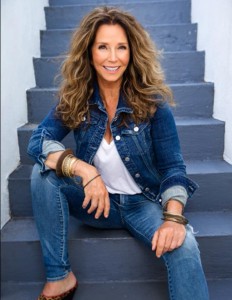 SR: Having seen this show myself, I can understand not just the evolution that you went through on an exterior level and cosmetic level, but also, of course, the (evolution) that you went through in terms of the way you live your life, (and) the emotional evolution that you and your character goes through in the series.
SR: Having seen this show myself, I can understand not just the evolution that you went through on an exterior level and cosmetic level, but also, of course, the (evolution) that you went through in terms of the way you live your life, (and) the emotional evolution that you and your character goes through in the series.
SG: Yeah. I mean, there’s confusion, there’s excitement. There’s denial. There’s pain. There’s laughter. There’s joy. I mean, the thing that is so great about Queering is that it’s raw, and that’s why I think that people that do see it just fall in love with it.
They fall in love with not only the way Leticia has written this series, but they fall in love with the characters and the things that they’re going through because it’s things that everyone can relate to, whether it’s a bad relationship, whether it’s a broken heart, whether it’s a disappointment within your family, whether it’s rejection from your friends or whether it’s great entertainment or comedy from Devon, who is played by the phenomenal Diana Oh. So there’s a lot of different ups and downs, and I think that makes it more real. We have ups and downs every day.
SR: Of course, not all viewers will find themselves facing the same situation that you and the other characters find themselves in in Queering. Yet they can definitely relate to how it portrays not just that struggle, but also the way the show portrays modern, romantic relationships as seen through Val and its other characters, and of course, the mother-daughter relationships portrayed in the series.
SG: Exactly. I mean, it’s not just about Harper being lesbian and Val being bisexual. It is about a mother-daughter relationship, and it is about friendships, and it’s about the changing of the mother-daughter relationship as they become adults and changing of friendships as you get older, whether you’re coming out as bi or not.
I mean, I know for myself, the older I get and the different paths that life takes us down, you interact with new people. You turn around this corner, and you’re not in the same world with maybe someone that you hung out with all the time a few years ago. So it’s always a changing kind of path that I think we’re on. This show really sheds light on a lot of those little issues, whether it’s the change with your friendships or your family or the heartache in a relationship or the fun that is out there in life and the little moments that can crack you up and the different people that you meet along the way.
SR: What was it like working on both seasons of Queering with the show’s creator, Leticia De Bortoli (who herself reacted the same way to her mother’s bisexuality in real life as Harper did to your character in Queering) and what was it like working with your castmates on the show?
SG: Because Leticia is such a good writer and is sharing so much of her own personal story and bringing to life different characters. It made it so much easier as an actor to be able to bring this character to life because I can sit there and have a conversation with Leticia about it and get her side. She had grown a lot from this experience in her life and gone through ups and downs, just like Harper is. So it made the job (of playing Val) easier and clearer.
There was more clarity for me because she was very specific and she did it all with humor. I love humor and feel that in this life, that if we don’t have our sense of humor, we’re in big trouble because life is hard, and it’s going to throw stuff at you all the time. We’ve got to have faith. We’ve got to have support systems, and we’ve got to have our humor, or it’s going to be a tough ride.
As far as the other castmates, it’s like a family. I mean, I’ve been on a lot of sets and hated for (each project) to end and everybody was like a family. Queering is really a family because we had such a small budget. We’re schlepping all over New York City, mostly in Brooklyn. Leticia is wearing 20 different hats because we don’t have the crew because we don’t have the budget. So it’s a labor of love. Everybody that was there really believed in this project. They love this project, and they wanted to a part of it and try to make it something special. So it was an absolute pleasure working on Queering, and I look forward to doing it again.
SR: Overall, what have you taken away from the experience of playing Val in Queering, and from the experience of working on this series?
SG: I think it’s made me a better person. I think it’s made me more mindful and just better informed (about) the LGBTQ community (and of) the struggles and the fears that truly exist. I think that it’s given me a deeper love for people of whatever it is that you’re struggling with. I think that it’s made me more mindful and understanding because I have a better understanding now.

L-R: QUEERING creator Leticia De Bortoli, COBRA KAI co-creator Josh Heald, QUEERING/COBRA KAI star Susan Gallagher and COBRA KAI/THE KARATE KID co-star Martin Kove attend a private screening of QUEERING.
SR: What do you want viewers to take away from watching Queering and from seeing what Val and the other characters experience in both seasons of the show?
SG: I hope that they themselves develop a better understanding (of the themes explored in the series), and if they’re struggling themselves, (I hope that they) gain some inspiration, (and) perhaps some courage and strength to be gentle with themselves, but (also some courage and strength) to take care of themselves and to keep their sense of humor, (and to realize) that this too shall pass, and we just have to take it one day at a time because really that’s all any of us have – just today, right now in this moment. We can still have fun. We can still have joy in our lives, no matter what’s going on.
…To have friends or people around you who love you and support you and can bring a smile to your face occasionally, I think that’s really important. I hope that they see that in the way that we portrayed these characters and the writing that Leticia has done such a great job with, and just put a smile on their face. There’s some hilarious writing (in Queering). I know that those have been a lot of the comments that I’ve gotten from the audience is how truthful it is and how funny. I love to laugh, so I hope people will get a giggle out of it. Some of it.
Watch Queering on YouTube:
Season 1:
https://www.youtube.com/playlist?list=PLn1NJv5pAc7F5BUw5oeoAQ-jUhGXvUnh7
Season 2:
https://www.youtube.com/playlist?list=PLn1NJv5pAc7GX_N39Za4DkX2WVPirKgT_
Connect with Susan at the following links:
ON THE WEB: http://susangallagher.com/
IMDB: https://www.IMDb.me/SusanGallagher
YOUTUBE: https://www.youtube.com/channel/UCsuSqGVcHIC2yxm54aoTLpw
FACEBOOK: https://www.facebook.com/SusanGallagherOfficial/
TWITTER: https://twitter.com/susanlgallagher
INSTAGRAM: https://www.instagram.com/iamsusangallagher/

